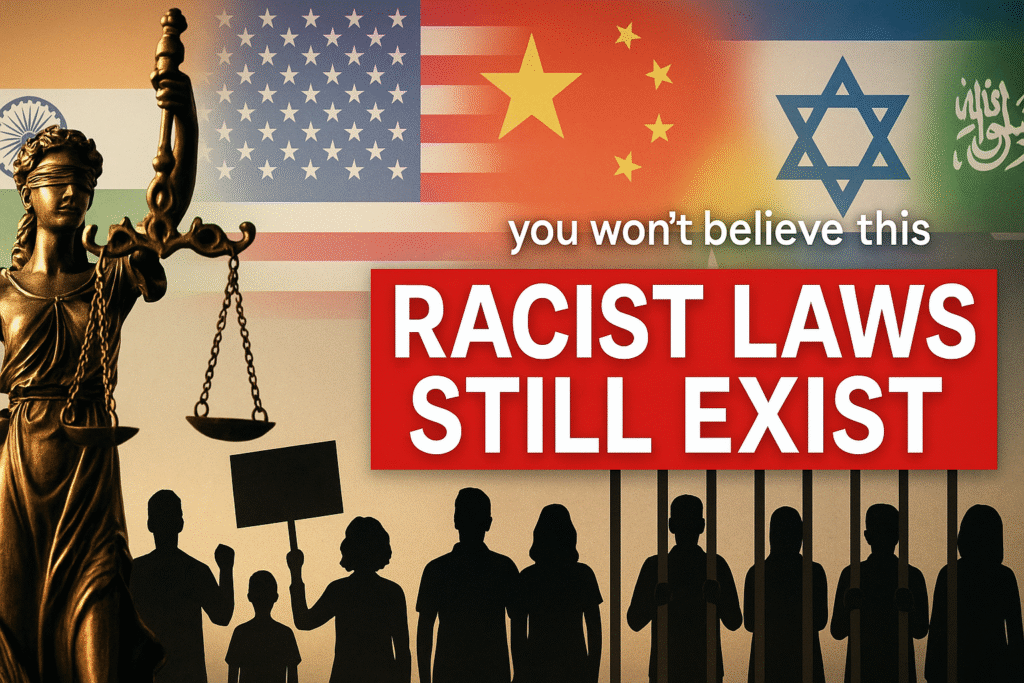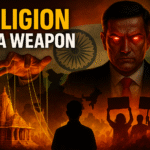In 2025, you might think racism is a thing of the past — something only found in history books. After all, many countries talk about equality, diversity, and human rights. But the truth is, racism still exists — and sometimes it’s built right into the laws and systems that govern people’s lives. ⚖️💔
Some of these laws are openly discriminatory, while others are hidden behind polite language or outdated policies. Either way, they continue to target people based on their race, religion, or ethnicity — often with devastating effects.
Let’s explore some real, current examples of racist or discriminatory laws that are still active in 2025.
🇮🇳 India: Caste-Based Discrimination Is Still Legal in Practice
India officially banned “untouchability” and caste discrimination in 1950. But in reality, Dalits (formerly known as “untouchables”) and tribal communities still face extreme racism — especially in rural areas.
- Manual scavenging, a practice where Dalits are forced to clean human waste by hand, is still happening — despite being illegal.
- Upper-caste violence against lower-caste individuals often goes unpunished.
- Temple entry, housing, and marriage restrictions still informally exist in some regions.
- Though the Indian Constitution promises equality, caste-based bias is deeply embedded in social and local legal systems.
🇺🇸 United States: Racial Bias in Law Enforcement and Sentencing
While the U.S. has strong civil rights protections, racial discrimination is still built into the justice system.
- Stop-and-frisk laws in some states allow police to search people without a warrant — and data shows Black and Latino people are targeted more often.
- “Three strikes” laws and mandatory minimum sentencing disproportionately affect Black men.
- Many states still allow prison labor — which some call modern-day slavery — with a high number of Black and Brown prisoners forced to work for little or no pay.
Even voting rights are affected: laws that require certain IDs or purge voter rolls have been shown to target minority communities.
🇨🇳 China: Laws Targeting Uighur Muslims
In the name of national security, China continues to pass laws that heavily control and suppress the Uighur Muslim population in Xinjiang.
- Religious practices like fasting during Ramadan, wearing a hijab, or growing a beard can be labeled as “extremism.”
- Uighurs are monitored, arrested, and sent to “re-education camps” where they face forced labor, cultural erasure, and abuse.
- Travel, language use, and religious freedom are all restricted by law for this ethnic group.
Despite international pressure, these laws and policies remain active in 2025.
🇮🇱 Israel: Laws That Treat Palestinians Unequally
In Israel and the occupied Palestinian territories, critics and human rights groups have pointed out laws and policies that amount to apartheid — a system of racial segregation.
- The “Nation-State Law” passed in 2018 gives Jews exclusive rights to self-determination in Israel, ignoring the rights of Arab citizens.
- In the West Bank, Israeli settlers are under civil law, while Palestinians live under military law — even if they live in the same area.
- Building permits, access to roads, and voting rights are severely unequal in occupied areas.
Groups like Amnesty International and Human Rights Watch have described this situation as legally racist.
🇸🇦 Saudi Arabia: Systemic Discrimination Against Foreign Workers
In Saudi Arabia and several Gulf countries, the “kafala” (sponsorship) system ties migrant workers to their employers — giving bosses near-total control over workers’ lives.
- Many Asian and African workers are underpaid, abused, and denied the right to leave or change jobs.
- Women face racial and gender-based abuse without legal protection.
- The law protects citizens over migrants — creating a legal system based on race and class.
Despite some reforms, the system still exists in various forms in 2025.
🇲🇲 Myanmar: Ethnic Discrimination Against Rohingya Muslims
The Rohingya people, a Muslim ethnic group in Myanmar, are denied citizenship under the 1982 Citizenship Law.
- They are considered “illegal immigrants” despite living in the country for generations.
- They cannot vote, travel freely, or access public healthcare and education.
- Tens of thousands live in refugee camps or in exile, facing poverty and violence.
The law hasn’t changed — and the Rohingya remain among the most persecuted people in the world.
🇪🇺 Europe: Discriminatory Policies Toward Roma People
Across Europe — including in Hungary, Slovakia, and Romania — the Roma (Gypsy) population faces systemic racism.
- Segregated schools and housing still exist, even in EU countries.
- Police conduct disproportionate raids in Roma communities.
- In some places, Roma women have been forcibly sterilized — a horrifying human rights violation.
Laws may not mention race outright, but they are applied in ways that clearly discriminate.
💡 Why These Laws Still Exist
These laws continue because of:
- Fear — of losing cultural or political power
- Nationalism — promoting one race, religion, or group as “superior”
- Corruption — where leaders use racism to distract from real problems
- Weak human rights enforcement — where victims have no way to fight back
🕊️ What Can Be Done?
The first step is awareness — knowing that these laws still exist.
Next comes action:
- Support organizations fighting for justice (like Amnesty International, Human Rights Watch, and local advocacy groups).
- Vote for leaders who stand for equality and reform.
- Speak out — online or in your community — against racism in all forms.
- Demand change, both legally and culturally.
✊ Final Thoughts: Racism Isn’t Always Loud — Sometimes It’s Legal
Racism doesn’t always look like hate speech or violence. Sometimes, it’s in court rulings, police stops, ID laws, and school funding policies. It’s quiet, it’s systemic — and it’s still here in 2025. 🧑🏿⚖️⛓️
But awareness is power. If we shine a light on these laws and demand better, we can build a more fair and equal world for everyone — regardless of race, religion, or nationality. 🌎✌️

